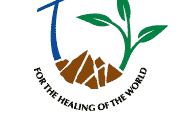






| The
Assembly Theme
"FOR THE HEALING OF THE WORLD" The theme was chosen by the LWF Executive Committee from suggestions made by the LWF member churches in 2000. It is inspired, among other biblical texts, by the apocalyptic vision in Revelation 22:2 of the river and tree of life: “…and the leaves of the tree are for the healing of the nations.” Compared to most former Assembly themes, this one explicitly points to the world and various contexts in which we live. The truth that faith confesses must come alive, be understood, confessed and lived out in ways that genuinely speak and respond to the world’s needs. According to Canadian theologian Douglas John Hall, confession takes place when we view the world through Christian belief and “are thrust into an active engagement with that which threatens the life of our world.” We cannot ignore a world that is festering with poverty, divisions, despair, sickness, violence, injustice—and situations of many kinds desperately in need of healing. HIV/AIDS and other diseases are stripping many persons and entire communities of life and hope. Those left even further behind by the forces of economic globalization become more ravaged and devastated, while others reach dizzying heights of affluence. Old and new rivalries break out, confounding the illusion that old wounds have actually been healed. Sin and its effects continue to be manifest in ever-new ways. When we assemble together as a communion, it will not be primarily to lament the state of the world. We gather because of our conviction and proclamation that the God we know in Jesus Christ through the power of the Holy Spirit is ‘for the healing of the world.’ This is the distinct witness we as Christians bring to this widely shared concern for healing. We will be exploring the implications of this for our lives, our congregations, our societies, and especially for us as a communion of Lutheran churches. Healing is a pervasive theme in Scripture, and especially in the ministry of Jesus. A number of the Bible studies will be from Luke’s Gospel. Here Jesus is conceived, baptized, and sent forth in ministry through the power of the Holy Spirit. He is seen as a Spirit-filled prophet who healed people of illnesses associated with unclean spirits. Jesus healed by restoring wholeness or integrity to people. Although ‘healing’ in the Christian tradition is closely related to salvation, forgiveness, reconciliation and liberation, it is a topic that makes some in our churches uncomfortable. Crosscultural perspectives on healing will need to be considered. Health is understood according to what is valued within a given cultural system. It includes more than physical health. The focus is not on the disease itself or on curing, but on how the personal and social meaning of the experience of sickness, injury or disability is transformed. To be healed is more than a personal experience. It involves the wider social, economic and political order of relationships. Social power is reordered through healing, which is why it often is threatening to the established order. Jesus reached out to touch others, or was himself touched, across taboo boundaries of impurity. He drove out demons whose possession made individuals powerless to act. He is depicted as being like a folk healer, one who took people’s needs for healing at face value. He entered individual lives and experiences of suffering, bringing concrete liberation. This theme suggests the need to give greater attention to the role of the Spirit, in a triune understanding of who God is and how God relates to the world. Through God’s Spirit we participate in the divine pathos, present in human history and throughout creation. We enter into communion with the crucified and risen Christ, in whom God’s Spirit has been made visible and tangible. Through that same Spirit, we enter into deeper communion with one another. For Luther, this was grounded especially in the Sacrament of Holy Communion, which we will celebrate daily at the Assembly. To ‘receive the Holy Spirit’ is to see what God is doing in and through the brokenness of our lives and world to bring healing and new life to human beings and the rest of creation. The Spirit empowers us to act differently in relation to one another. Polarity and hostility that can contribute to violence are overcome in favor of a community of solidarity, responsibility and love. Finitude and vulnerability are accepted rather than what we seek to overcome. Love reaches out and draws others in, creating diverse networks of relatedness such as we can expect to experience at the Assembly. [Site Map] [LWF Assembly Home] [Links] [LWF Home] |

|